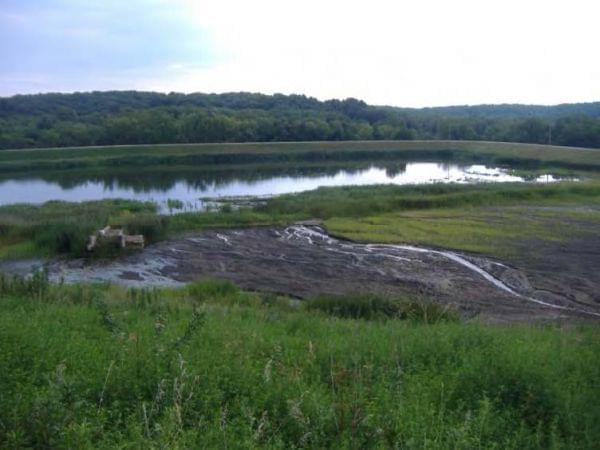U.S. District Court Dismisses Lawsuit Against Dynegy For Polluting The Middle Fork

A view of the New East Ash Pond at the retired Vermilion Power Plant near Oakwood, Illinois Photo by Dewberry & Davis, LLC obtained via Open Records request
A federal judge in Urbana has dismissed a lawsuit filed in May by the Prairie Rivers Network against Dynegy Midwest Generation.
The lawsuit alleged Dynegy was violating of the Clean Water Act by allowing toxic coal ash to pollute the Middle Fork River. The ash is stored in three ponds at Dynegy’s retired Vermilion Power Station near Oakwood. Dynegy’s tests show contaminated groundwater is flowing through the ponds into the river. But the ruling by Judge Colin S. Bruce of the U.S. District Court for the Central District of Illinois said pollution of surface water through discharges in groundwater isn’t covered by the Clean Water Act (CWA).
Enacted in 1972, the CWA established federal regulations to protect the nation’s “navigable waters,” such as rivers, lakes, and streams. Citing precedent from the Court of Appeals for the Seventh Circuit Court in the case of Village of Oconomowoc Lake v. Dayton Hudson Corporation, the District Court ruled that “discharges from artificial ponds into groundwater are not governed by the CWA, even if there is an alleged hydrological connection between the groundwater and surface.”
“We took a different view of that,” said Thomas Cmar, who served as lead attorney for Prairie Rivers on the case. “We think the statute is very clear that it covers all pollution whether it passes through an underground channel before making it to a river or whether it's directly dumped into a river or through a pipe.”
Other courts have also taken a different view from the District Court ruling. In February the U.S. Court of Appeals for the Ninth Circuit ruled in Hawai'i Wildlife Fund v. County of Maui that pollution of surface water from a “point source” contamination of groundwater does constitute a violation of the Clean Water Act. On April 12 the Fourth Circuit issued a similar ruling in Upstate Forever v. Kinder Morgan Energy Partners, L.P., concluding that a spill of pollutants passing through groundwater before reaching “navigable waters” does violate provisions of the CWA.
But other recent rulings agree with the District Court. In August the Court of Appeals for the Sixth District ruled that “the CWA does not extend liability to pollution that reaches surface waters via groundwater.” In September the Fourth Circuit also ruled that pollutants passing through groundwater to surface water don’t violate the CWA.
The conflicting opinions by the Courts of Appeals can only be resolved if the Supreme Court takes up the issue of contamination of waterways by indirect discharges.
Cmar says that meanwhile, Prairie Rivers will seek other remedies, such as engaging with the Illinois EPA. “I would just emphasize is that is one small step in what we see as a much larger effort to ensure that the Middle Fork is permanently protected,” he said.
Dynegy declined to comment on the dismissal of the lawsuit.
Links
- Officials Call For A Public Hearing As Coal Ash Continues To Pollute The Middle Fork
- Loose Regulations Allow Coal Ash To Threaten River
- Prairie Rivers Network Suing Dynegy To Clean Coal Ash Pits Along Vermilion River
- Pollution Panel Weighing New Rules For Coal Ash
- Middle Fork Of Vermilion Named To Endangered River List

